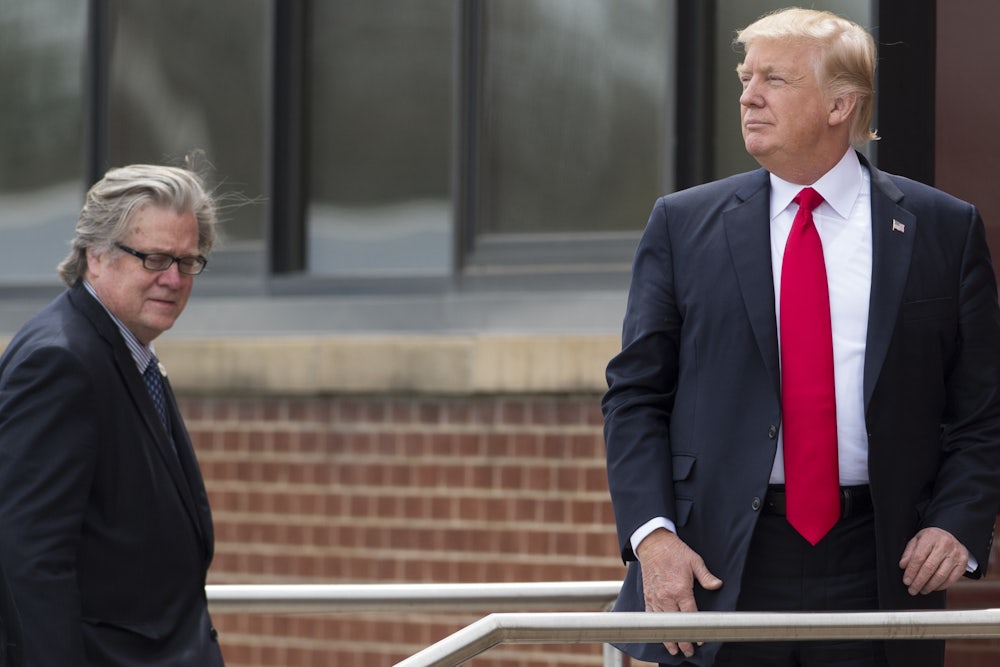Steve Bannon’s departure from the White House on Friday ends months of speculation about the fate of the president’s most controversial adviser. Progressives are likely to breathe a sigh of relief, since Bannon was the dominant figure in the Trump administration’s white nationalist wing. Conversely, Bannon’s fans among the alt-right, especially staffers at his former publication Breitbart, are having a public meltdown.
— Joel B. Pollak (@joelpollak) August 18, 2017
And kids, that's the day when Bannon the Barbarian was born...
— Charlie Spiering (@charliespiering) August 18, 2017
Fellow-traveler Ann Coulter was equally distraught:
STEVE BANNON OUT! Media is the most powerful branch of government.
— Ann Coulter (@AnnCoulter) August 18, 2017
Bannon seems to think his own departure is a harbinger of major change. He suggested that the White House will now be dominated by “Democrats, bankers, and hawks” which will upset Trump himself, given the president’s nationalist instincts:
Bannon has told associates in recent days that if he leaves, Trump WH will be "Democrats, bankers, and hawks." Predicted POTUS would rebel.
— Robert Costa (@costareports) August 18, 2017
Bannon friend says Breitbart ramping up for war against Trump. "It's now a Democrat White House," source says.
— Gabriel Sherman (@gabrielsherman) August 18, 2017
All these responses are overwrought. In point of fact, it’s exactly because Trump’s instincts are aligned with the nationalist right that Bannon’s departure is likely to change little. The problem with the Trump administration is not that there was a white nationalist whispering in Trump’s ear; the problem was that there is a white nationalist whispering inside Trump’s own brain. That white nationalist will dominate American politics as long as Trump is in the White House.
As Wall Street Journal editor Gary Rosen observed, “The character of a presidency is determined by the President, not by his staff.” Trump’s character is already all to familiar to the entire world: He is a 71-year-old self-absorbed racist who is too lazy to follow the details of policy and prone to making capricious decisions. Trump’s character is fixed, and no amount of staff change can possibly make any difference.
As Peter Beinart wrote in The Atlantic on Friday, Trump’s racism long predated his association with Bannon:
As Trump himself likes to note, Bannon joined his campaign late, in August 2016. By that time, Trump had already called Mexican immigrants “rapists,” falsely accused American Muslims in New Jersey of celebrating the 9/11 attacks, said “Islam hates us” and declaredthat Judge Gonzalo Curiel could not fairly judge the case against Trump University because was Mexican-American. Bannon’s hiring was not a cause of the Trump campaign’s dalliance with Islamophobia, nativism and white nationalism. It was a result.
In fact, Trump has been exploiting bigotry since before he hired Bannon, before he ran for President, before he even entered public life. In 1973, at the age of 27, Donald Trump—then President of Trump Management—was sued along with his father for discrimination against African-Americans by the Justice Department. In 1989, when four African-American and one Hispanic teenagers (the “Central Park Five”) were arrested for rape, Trump took out newspaper ads declaring that the accused should be executed and “forced to suffer.” When DNA evidence exonerated the young men in 2012, Trump denounced New York City’s decision to compensate them, saying “I think people are tired of politically correct.” As late as 2013, he still tweeted, “Tell me, what were they doing in the Park, playing checkers?”
Nor is Trump ever likely to be fully out of touch with Bannon. Even when he supposedly fires a staffer, as he did with campaign manager Corey Lewandowski and advisor Roger Stone, he still keeps in contact with them, often turning to them for advice. As The New York Times John Herrman joked:
Steve Bannon Relegated To Merely Talking On The Phone With The President Every Day
— John Herrman (@jwherrman) August 18, 2017
As the erstwhile CEO of Breitbart, Bannon is a formidable figure in the alt-right movement that carried Trump into the White House. Already a rogue figure in the West Wing, where he constantly feuded with rivals like former chief of staff Reince Priebus and nepotism hire Jared Kushner, Bannon could be even more troublesome on the outside. Free from the constraints of working with other White House staffers, Bannon will use Breitbart ever more explicitly to push for a nationalist agenda. His biggest impact is likely not to be on the president directly—there is little evidence that Breitbart is part of Trump’s media diet—but on other right-wing outlets like Fox News.
Bannon is likely to resume his old ways as a publisher and political agitator, while Trump will remain a bigoted president. Neither reflects a major change in the way the Trump administration works.
